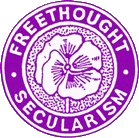George Fox (1624 - 1691)
An Influential Man of Leicestershire

George Fox was born in July 1624 in the small village of Drayton-in-the-Clay, Leicestershire (now known as Fenny Drayton).
His father was a prosperous weaver and churchwarden known as "Righteous Christer". George was taught to read and write and take religion seriously. He became an apprentice shepherd in his teens, which gave him time to study the bible, and aged 19 in 1643, he headed of London driven by a “hidden voice”. The Civil War had begun and he was in a state of torment.
Returning to Drayton-in-the-Clay after a year, he had a number of discussions with the local Anglican clergyman, who later called Fox mad and spoke against him. He continued travelling and discussing religion with clergy and those who were interested in religious thinking.
Fox’s Resulting Ideas
- Rituals can be ignored (baptism)
- Anyone has the right to minister including women and children.
- God "dwelleth in the hearts of his obedient people"
- Religious experience is not confined to a church building -"steeple-house". Worship was valid in fields and orchards.
- Believers could follow their own inner guide rather than rely on a strict reading of Scripture or the word of clerics.
- No distinction between Father, Son and Holy Spirit (Trinity)
Society of Friends
In 1647 Fox began to preach publicly and a group started to follow him around which became the Society of Friends. Some of the Friends also started advocating Fox's teachings and, as uncompromising preachers, they were violently attacked in some places.
Religion was in flux with many rival denominations/sects meeting during Civil War (1642–1651) including the Congregationalists, the Baptists, Calvinists, Calvinistic Presbyterians, Lutherans, Catholics, Anglicans, Unitarians, the Ranters, the Fifth Monarchists, the Seekers and the Muggletonians. The Jews were allowed to resettle in 1656. However toleration was not extended to all and some sects were seen as a threat to to public peace, social order and property rights and therefore open to prosecution and discrimination.
Fox and the Friends soon found themselves subject to prosecution as they
- didn't hesitate to complain about judge's decisions considered morally wrong;
- campaigned against the paying of tithes;
- asserted that the established church was unnecessary;
- refused to swear oaths (particularly of allegiance) or take up arms;
- refused to use or acknowledge titles, take hats off in court or doff hats or bow to those who considered themselves socially superior such as the aristrocracy.
Fox was imprisoned several times:
- Nottingham in 1649
- Derby in 1650 - he was imprisoned for blasphemy. A judge mocked Fox's exhortation to "tremble at the word of the Lord", calling him and his followers "Quakers"
- Carlisle 1653
- London 1654
- Launceston 1656
- Lancaster 1660
- Leicester 1662
- Lancaster again and Scarborough 1664–1666
- Worcester 1673–1675
Quakers were subject to various charges
- Blasphemy;
- Causing a disturbance;
- Travelling without a pass;
- Unauthorised worship;
- Restoration, and the Quaker Act 1662 specially directed against people, who refused to take the oath of allegiance.
Between 1650 and 1660 many new groups were established around England, particularly following Fox's "Vision" on Pendle Hill (1652)and his alliance with the Fells who were fundamental in the organisation of the movement. Fox subsequently travelled to Ireland (1666), America (1671), the West Indies (1677)and the Netherlands and Germany (1684) setting up new groups of Friends. George Fox died on 13th January 1691 in London.
The Society of Friends that he had founded (Quakers) would be responsible for establishing the anti-slavery movement, prison reform, demands for social justice, equal rights for women and children, consensus decision making and the promotion of a strong work ethic based on treating all involved fairly. (Quakers founded Barclays & Lloyds banks, Clark’s shoes, Cadbury, Rowntrees and Fry’s chocolate). In 1947 the Quakers became the only religion to receive the Nobel Peace Prize.
Influence of Fox’s teachings
The teaching of George Fox that there was something ‘of God in every person’ was revolutionary for his day. Most religions had been hierarchical and used to support the authority of the hierarchies of the state and its established religion. While his movement attracted disapproval from some, others such as William Penn and Oliver Cromwell viewed Fox with respect. By the time of his death in 1691, the Quaker movement had 50,000 followers.
William Penn (1644 - 1718) established Pennsylvania 1682 as a Quaker commonwealth run under Quaker principles. He was the first to call for a union of the English colonies and the “Pennsylvania Frame of Government” and “Charter of Liberties” inspired much of the US Constitution. These documents limited the power of the governor and stipulated two houses for the legislature, fair trials by jury, protection of minority rights, freedom of religion and free elections. They incorporated an amendable constitution and bill of rights.
The ideas of Fox, the Society of Friends and Penn were influential with Voltaire and Tom Paine (whose father was a Quaker). It could be said that the motto of Liberty, Equality and Fraternity was to some degree inspired by the ideas of the Quakers. The constitution of Pennsylvania and the ideas of Tom Paine were influential in the American War of Independence and the subsequent Constitution and Bill of Rights. The American revolution and Quaker ideas together with those of Tom Paine influenced thinking in pre-revolutionary France.
Certainly the Quakers were fundamental to the abolition of the Slave Trade and legal slavery and were strong supporters of the Universal Declaration of Human Rights which very much accords with Quaker thought.
Links
The Autobiography of George Fox
'The truth sprang up first in Leicestershire': George Fox, 1624-1691 and the origins of Quakerism
The Quakers of Leicestershire 1660 -1714
George Fox and Leicestershire by Gertrude Ellis
A popular life of George Fox by Josiah Marsh
‘1624 Country’ a guide to the area where Quakerism was conceived
Free Course on the early history of the Quakers and George Fox
Page updated 13/07/2023











